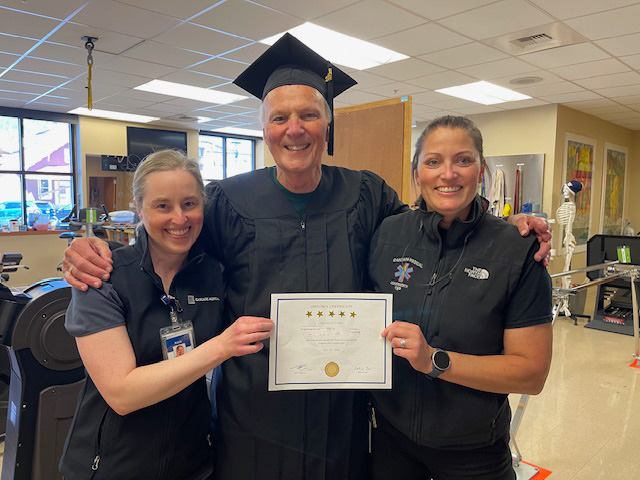What is Cardiac Rehab?
Cardiac rehab offers individualized prescribed exercise therapy, education and social support. It’s also an important part of the treatment to your specific heart problem.
By participating in the program, individuals get actively involved in managing their health and improving their quality of life. Did you know: recent scientific studies have shown people who complete a cardiac rehabilitation program can increase their life expectancy up to 5 years!

Cardiac Rehabilitation at Cascade Medical is a Phase 2 Program:
Phase 1:
This phase begins while the patient is still in the hospital. It includes mobility, walking, and simple exercises provided by the rehab services team. It is designed to improve functional ability of the patient, provide education, and ensure safety. Patients and families are included in this phase of rehab.
Phase 2:
This is a physician prescribed, closely monitored exercise program in outpatient environment. Patients will have a personalized exercise program designed to safely increase endurance and fitness levels. Education and social support are combined with exercise to make positive lifestyle choices. Patient fitness should be continued post-rehab through home exercise, fitness facility, or community-based exercise program.
What to expect:
- First visit- review of medical history, set goals for health and exercise, put patient on telemetry and take vitals to get baseline measurements, complete simple physical tests to find your current activity level
- What to bring: blood sugar testing equipment if you are diabetic, nitroglycerin pills if you have been prescribed them, list of your medications for review if you have a current one, questions and concerns
- Wear comfortable clothes you can move in. Feel free to bring water bottle if you like, but we have water available in our rehab gym.
Who is most likely to benefit from Cardiac Rehabilitation? If you have one of the following diagnoses, you may be eligible to participate:
- Heart Attack
- Angina
- Cardiac surgery, such as coronary bypass or valve surgery
- Coronary artery angioplasty or stents
- Heart failure
- Heart transplantation

Is this covered by insurance? Cardiac Rehab is generally covered by most health insurance companies, but check your plan to determine copays or other requirements.
Who will be leading my Cardiac Rehab? Our team includes Physical Therapists, Exercise Physiologist/Paramedic, along with a Physician Medical Director. Additionally, there are opportunities to meet with Dietitians for group or individual learning, Behavioral Health, and Social Work as needed.
These are small group classes of 1-4 participants, meeting 3 days/week: M,W, F
Benefits of Cardiac Rehabilitation:
- Live longer and lessen your chances for another heart attack
- Control heart disease symptoms such as chest pain or shortness of breath
- Stop or reverse damage to your blood vessels in your heart
- Lessen the physical and emotional effects of heart disease
- Improve your stamina and strength, getting you back to your usual activities, including work, hobbies, and regular exercise
- Improve your confidence and well-being

Cardiac Rehabilitation Offers:
Assessment of your personal risk factors for heart and blood vessel disease
- Beginning and maintaining a personalized exercise plan that works for you
- Psychological/stress assessment and counseling
- Education and support to make healthy lifestyle changes such as:
- Maintaining a healthy weight
- Heart healthy eating
- Avoiding tobacco and environmental smoke
- Opportunity to meet and share stories with other patients like you
- Monitoring and better control of:
- Blood pressure
- Lipids /cholesterol
- Diabetes
- Improved communication with your doctor and other healthcare providers about your progress following your cardiac event
